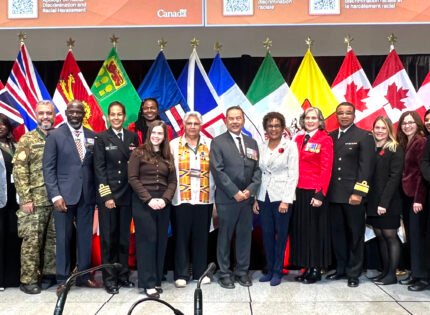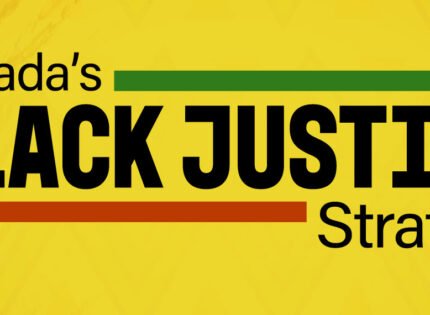SEEKING A UNIFYING AND CREDIBLE VOICE for the community FROM THE LIONS DEN:
Clarence Bayne
Most Blacks in Montreal in the 50 to 85 age group can recall the experience of the sense of purpose and unity of voice and achievement that the Black community as a whole felt under the leadership and philosophy of the Black Community Council of Quebec (BCRC).
This was matched at the National level by the National Black Coalition of Canada. The BCCQ was a Pan-Black umbrella organization that excluded organizations that were religion-based, gender-oriented, or country of origin specific. It served the English Speaking Black community primarily. However, by the late 1990s there was a general movement to broaden its representation to include all Black organizations. This lead to the first Black Community Forum at Val Morin, July 3-5 1992.
In 1995, partly as a response to the Forum’s call for the strengthening of community organizations and the family, the BCRC was launched with funding from the federal government of Canada. The late Honorable Senator Sheila Finestone, one of Montreal’s great defenders and protectors of minority rights was the voice for the project. A central focus of BCRC was to support organizations in the Black community and to co-ordination the flow of resources from mainstream society to meet the development needs of individuals and organizations in the Black English speaking community: to complement rather than duplicate services that were provided by member organizations. It was the community’s response to a concern of the Val Morin Black Community Forum to avoid duplication whenever possible:
“Avoid duplication, Instead of reinventing the wheel by having two similar programmes in place at the same time, we must have one programme that functions to its fullest capacity.”
Thus, regular co-ordination sessions were held to discuss economic development, employment, health, parenting, organizational literacy and fundraising. The Executive Director of BCRC represented the community in many public and private sector forums and government briefings and information sessions.
However, initial Government financial support waned with the changes in Governments and shifts in policies and priorities towards a Harper type Conservatism, and towards French linguistic conformity and cultural nationalism in Quebec. This is a matter of much concern to the BCRC and its network of partners and collaborators. Under the Conservative Government and in the face of increasing public demands for accountability, and a shrinking funding base, Government policies began to emphasize project financing rather than the core funding of organizations. These shifts in the funding formula have had a significant impact on the operations of Black community organizations and their capacity to participate more fully in the democratic process. In particular, it has placed limits on BCRC’s operations, and reduced its capacity to sustain its assistance to Black community organizations and Black community development and vitality. A recent survey by the Institute for Community Entrepreneurship and Development (ICED), JMSB, Concordia University (2014) on the critical needs of Black organizations reveal that key Black organizations operating in the English speaking Black communities are under-resourced and underfunded. To address these problems as a community the BCRC Black Community Leadership Forum called key organizations to a Forum on June 16. Validation for this meeting was based on the recommendations, principles and protocols established and approved at the first Black Community Forum held at Val Morin, July 3-5 1992.
At that Forum, community leaders expressed the need for a permanent mechanism for ensuring that the essential requirements for successful community planning and development can be met and sustained at a level that significantly moves the Black community to higher peaks in the Quebec fitness landscape. The BCCQ was given the mandate to put this into effect and subsequently inherited this role in the late 1990s. Notwithstanding the drastic reduction in federal and provincial funding, the BCRC has at individual private sacrifice and financial cost provided a full range of development services to the community and Black organizations serving the community.
At the June 16 Forum held at 6767 Cote des Neiges the permanency of the Forum was reaffirmed; and the BCRC accepted as the official Secretariat of the Black Community Forum. Its function is to oversee the implementation of the recommendations of the Forum.
One important task given to the Secretariat is the representation of the problems affecting the development and fuller participation of the Black community in the Quebec and Canadian societies.
In a recent letter to the Provincial and Federal Governments and the City of Montreal the Forum made the following representation. “It is our observation that the vitality of the White English and French speaking minority communities are better supported by all levels of Government in Quebec. There can be no question that the Federal Government is very determined that the vitality of the White English speaking populations in Quebec is sustained. Indeed, the Canadian Charter of Rights and Freedoms make multiculturalism a central pillar of Canadian nationhood. However, the quasi-constitutional arrangements, through which it is executed, maintains the bilingual two nations view of Canada as a basis for the guaranteeing of those rights and freedoms.
In fact, in 2016, an application submitted by the Black History Month Table to the City of Montreal for funding to participate in the Montreal 375th Anniversary was rejected by the City’s selection and planning committee. Moreover, the City’s plan was so “White and French” that it drew major criticism from the English speaking and other cultural minority communities. Complaints from the Black History Month Round Table Ad Hoc Community Committee for the 375th continues to produce no positive change in the exclusion of Blacks.
As a bare minimum, multiculturalism in a parliamentary democracy requires that all cultural/ethnic groups must have or be afforded the capacity to be informed and to inform the Government; and to participate fully in the social, political and economic processes of the society: this requires that there is in place a system of laws, democratic institutions and practices, an appropriate fair and equitable distribution of social and economic capital among all its citizens.
In Canada, this is recognized, but honoured more in the breach than in the observance/practice with respect to Blacks and other visible minorities. All political parties and leaders at all levels of Government in Canada have paid lip service to this and the need to facilitate the integration of visible minorities into Canadian society. Examples are the Parliamentary Special Committee on the “Participation of Visible Minorities into Canadian Society: The Equality Now Report, March 1984”; and in Quebec, the Yolande James “Task Force Report on the Full Participation of Black Communities in Quebec Society”; and in the general case, the official languages Act (OFA) with its Enabling Fund.
However, none of the Governments have put in place specific mechanisms that are committed on a long term basis to the creation and sustaining of institutional assets and capacity in the Black communities to enable and support sustained full participation in the social, political and economic processes of Canadian society. This is particularly the case in Quebec with respect to the English speaking Black communities where we have seen the rapid decay of their local institutions over the last 30 years with no effective response from Governments to their request for help. On the other hand, we note the major enactment of policy and legislation to mitigate the threat posed by Bill 101 and the Quebec Charter to the White English minorities and their institutions in Quebec. Special arrangements have been put in place to protect the rights and institutions of the two “founding peoples” of Canada. In particular, this applies to the Official languages Acts of 1969 and 1988 which, among other things, for social and funding purposes essentially divide Canada up into spaces “designed to develop and maintain Canada in a racial hierarchy as solely a White settler society.
To ensure that the vitality of the White minority communities are guaranteed and sustained, the Federal Government provides substantial core and infrastructure funding for long-term development of the institutions and community-based organizations in the White English speaking Communities in Quebec. On the other hand, neither the Federal nor the Provincial Governments consistently follow through with strategies directed at meeting these needs for English speaking Blacks. We are treated as enclaves of the White English speaking minority with second level priorities. We must compete with their mainstream institutions for grants aimed at meeting their priorities, not specific to our needs. A tragic consequence of this indifference is the demolition of the Negro Community Center of Montreal. A special plan could not be developed to save the 90-year-old building of the Negro Community Center of Montreal. Because, according to mainstream protocols and practices regarding Government capital funding, it was not able to raise the required matching funds, and was sold for taxes and torn down in November 2014.
Apart from the above tragic consequences of underfunding or lack of strategic funding, there is also its resulting creation and perpetuation of the inability, due to under-capacity, to participate in the dialogue initiated by the various ministries with Canadians.
It is not that the system is technically incapable of addressing these problems more equitably; it is rather that the managers of the system do not see us as part of their “kit and kin.” Our lives and the quality of our lives is not a priority in their hierarchical settlement system of nation building. Black administrators in our community, apart from living through disruptions in income flows due to this disregard by the White dominated social, political, and economic system, must also face a dim future of lower income flows because of the absence of pension plans in Black organizations. This is certainly not the case in the White mainstream voluntary sector. The Government and the system look after their “own.”
It is our opinion that the Federal Government and the Provincial Government pursue an accommodation policy of biculturalism with linguistic singularity as a component when dealing with the Black and visible minority communities in Quebec. This differs from multiculturalism and two official languages as practiced elsewhere in the Nation. What It means is that French Quebec is allowed to act to limit our rights and freedoms if they feel that the French culture and language is threatened. The charter of values is an extreme example of that. The OLA 1988 set the physical boundaries within which this is practiced. In addition, the changes and differences in the demographics relating to the representation of various minorities in regions across the Province tend to heighten these social inequalities, racism and linguistic discrimination, and racial and religious profiling in the justice system. Adding to this undesirable complexity is the fact that funding policies of the municipalities differ from municipality to municipality and do not seem to be based on a systematic set of community development strategies and policies that address the particular needs of disadvantaged racialized ethnic minority groups such as the Blacks in Montreal.
So, we pose the question, “In practice, beyond the posturing and the window dressings of the Commissions, the special parliamentary committees, the Federal, Provincial and City task forces, the Police Chief’s admission of racial profiling in the police establishment, the toothless Quebec human rights commission is justice seen to be done for Blacks; do Black lives really matter to your strategic planners, policy makers, administrators and implementers of the laws, and protectors of rights and freedoms?” . We do not think so. Nor does CRARR, La Ligue des Noirs, nor those seeking a redress to systemic racism in Quebec and Canada at the World Social Forum held in Montreal in August 2016














